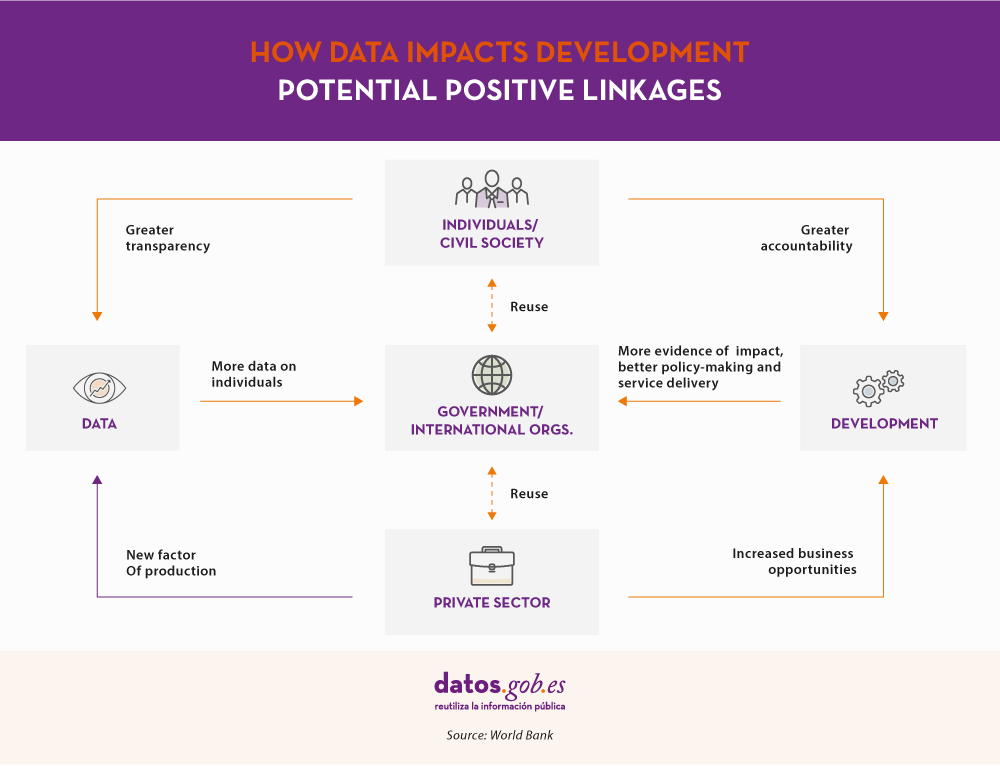
Earlier this year the World Bank announced that its next annual World Development Report would focus on the role of data in development. Each annual report of the World Bank has always been an important milestone in the world of development, but the next report, scheduled for next year, will be even more special because it is the first one focus on the world of data.
We already know that the main theme guiding the development of the report will be "Data for Better Lives", and it will be based on the premise that, while recent years have shown that high-quality data are indispensable tools for effective public policy formulation, the availability of the data needed for proper decision-making is still too low today. As a consequence, a large part of the value of data remains untapped.
Thus, the final objective of the report is to understand the barriers to the proper exploitation of data in the developing world and to explore two possible avenues that together would lead to the solution needed to unlock the full potential of these data:
- On the one hand, addressing data governance considerations and making the necessary changes in the way data is collected, managed, analysed and used in the current global environment.
- On the other hand, by considering how combining public and private data could lead to better results, with public data offering better coverage of populations of interest and private data with greater frequency, timeliness and granularity.
To this end, the World Bank team has been working on an initial draft as a proof of concept, explaining their vision of how data could have a positive impact on development, while introducing us to the other issues to be addressed by the report, including: "the use of data in public policy, data in the private sphere, synergies triggered by data, and the various challenges in terms of infrastructure, regulatory systems, economic policies and data management systems that we will have to face in the process".

In addition, the World Bank has prepared a round of consultations that will run until the end of this month and which aim to deeply understand the scope of the challenges outlined by answering a number of questions:
How can data contribute to development?
It seeks to understand how data can contribute to improving people's lives in the context of global development, as well as the role of governments and data markets in making more effective use of data. It will also discuss how data can be used to understand the impact of public policies and improve services while mitigating potential risks associated with their intensive use, and how data must be managed to make this possible.
What are the current gaps in national data systems?
To explore what types of resources and investments will be needed, both financially and humanly, to realize the long-term vision of a large data system that can unify data management. This system will be managed by a fully resourced government agency. In this aspect, it is also fundamental to understand what barriers managers and users face through the different layers of the infrastructure.
What are the legal and regulatory challenges?
The objective is to establish the legal basis and the necessary actors to establish and regulate reliable data flows, maximizing their benefits while minimizing the possible associated risks. Here the key will probably lie in finding the right balance between sometimes conflicting concepts such as openness, transparency, right to information, interoperability, accountability, privacy and security.
What are the economic policy challenges?
The report will analyse what is the real impact on less developed countries of an economy that is increasingly driven by data, resulting in a large market concentration in a rather limited number of companies that in turn have the largest capitalization values in the world today. Enabling appropriate policies to ensure competitive markets, adequate trade rules and a fair taxation scheme will be crucial for those countries that are currently disadvantaged by large private players.
This initial round of consultations will remain open until the end of the month and during this time anyone can provide comments on the general concept of the report through this form. The authors of the report are also particularly interested in good practices and examples of how the data has helped improve the lives of those most in need to date, and encourage anyone who want to share a case directly through WDR2021@worldbank.org.
The next stages in the development of the report will also be announced through the website they have prepared to coordinate all work until the final version is made public early next year.